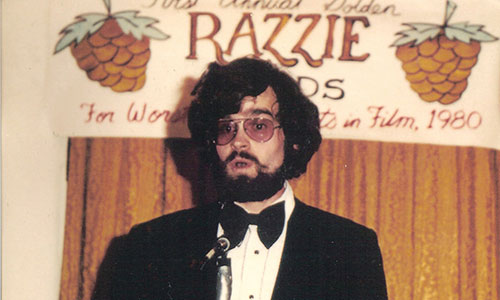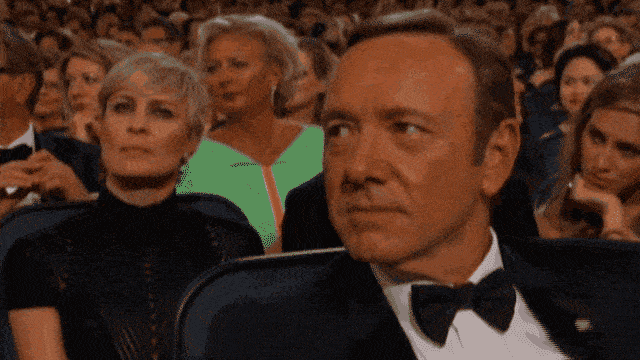You're a Winner
We don't know when the Oscars are, but we bet you might learn something from this post about award show trivia.

The master of awards-show counterprogramming
For most people, March 31st, 1981 was a pretty ordinary night after a not-so-ordinary day. The news had been pretty crazy that week, with Ronald Reagan having been shot by John Hinckley, Jr. the previous day, but with Reagan on the mend, the Academy Awards returned to the air after a 24-hour delay. (Ordinary People won big.)
John J.B. Wilson, a 26-year-old film buff, did the usual—he held a party at his house where he and his friends snarked wise on the stuff happening on the screen. But it was what he and his friends did after the ceremony that changed the course of his life. Wilson, standing in his living room, decided to hold an impromptu awards ceremony for the worst films of the year, with Village People vehicle Can't Stop The Music turning out the be the big winner among his group of friends. That's how the Golden Raspberry Awards were born.
He was inspired by a double-feature he saw that year—Xanadu and Can't Stop The Music, all in one painful sitting.
“I remember driving home and thinking in my head, ‘If there were awards that recognized horrible movies, what would be nominated?’ It was never a one-category thing, I always imagined it as a full show,” Wilson told the UCLA Daily Bruin last year.
His cardboard podium and cheesy event was a huge hit, and Wilson had a ton of fun doing it. Being a publicist, it gave him an idea: What if he promoted it annually? Wilson sent out press releases, and began holding the Razzies each year. Eventually, he figured out that if he held his event the night before the Oscars, the press would actually come and cover it. And they did, because they had nothing better to do.
The trick worked, and soon enough, the Razzies became almost as well-known as the Oscars, occasionally earning notice from some of the nominated stars.
You could argue that the Razzies started a trend. Since that point, awards shows (and the buzz around them) have grown like weeds around the Oscars, with dozens of awards ceremonies—most of them tiny or narrowly focused—being held in the weeks and months before the Academy Awards. Hell, AARP even has an awards ceremony now … and then, there's the PAWSCARs.
And we can thank a master publicist for it all.
$219k
Five obscure awards categories in famous ceremonies
- Grammy Award for Best Surround Sound Album: The high-resolution audio market is the music industry's version of "fetch"—it won't happen, but that won't stop them from trying repeatedly. (Sorry, Pono fans.) This category is something of the last vestige of the legacy created by SACD and DVD-Audio, but it's still going strong. Beyoncé won this year, though I'm guessing she would have been willing to trade with Beck.
- Grammy Award for Best Spoken Word Album For Children: The Grammys have had so many awful award categories over the years that we have to talk about them twice in a row. The National Academy of Recording Arts and Sciences eventually figured out that there may be too many Grammy categories, paring back a couple of years ago, but not before handing out this incredibly specific category for 16 years. The award tended to draw prominent winners: Back in 2004, Mikhail Gorbachev, Bill Clinton, and Sophia Loren won for their rendition of Peter and the Wolf.
- Academy Award for Best Original Musical: What would it look like if there was an Academy Award category and nobody ever qualified for it? Well, it'd look like the Academy Award for Best Original Musical, which has never been handed out under its current name, because nobody makes musicals that aren't adapted from Broadway plays. (The theoretical category exists in the Academy's rule books to this day—check out Rule 15 in this document.) The last time it was handed out under a prior name was in 1984, when Prince's Purple Rain won for "Original Song Score."
- Daytime Emmy Award for Outstanding Legal/Courtroom Program: Let's just ponder this for a moment—there are enough daytime courtroom TV shows that the Daytime Emmys can hand out an award for them every year. Talk about a sad commentary on society. The show Cristina's Court won the award three times in a row—despite only being on the air for three years.
- MTV Movie Award for Best Sandwich in a Movie: Why this only appeared once—back in 1996, when the Harvey Keitel vehicle Smoke won for an apparently epic ham and cheese sandwich—we have no idea.
one
The number of people who have won both an Ig Nobel Prize (for works of science that are bizarre and unusual) and a Nobel Prize (for doing something so impressive that it could perhaps change the world). Sir Andre Geim pulled off the dual-threat setup for his work in doing two super impressive things: Levitating a frog and helping to discover graphene. Guess which one of those won him the Nobel Prize for Physics.

They actually give out awards for this stuff
Let's face it: If you know someone or have an inkling of desire to do anything, there's a chance you can probably win an award for it. If you have a dirty mind, you can win an award for bad sex writing from the U.K.'s Literary Review. If you're not into bad sex writing per se, you can always work on the title—the Bookseller/Diagram Prize for Oddest Title of the Year once went to an entry titled The Big Book of Lesbian Horse Stories. And if you're not into writing books but just starting them, this is the contest for you.
You may be a terrible actor, but if your dog isn't half bad at following commands, you might still be able to make it at Cannes, where they give out the Palm Dog every year. The competition is fierce, though—the victor in 2013 won for playing Liberace's blind poodle. And failure isn't a bad word, anyway: If you're in the NFL and nobody wants you, they just call you Mr. Irrelevant. In cycling, people fight for last place in the Tour de France!
If you're Canadian, you might often get called boring, but don't worry, you'll never be as boring as Stephen Harper, who has won an award for that honor. And while the Darwin Awards are all played out, awards for bad programming will never go out of style.
This might be a controversial argument, but it needs to be made: Nine times out of ten, the awards being handed out by a given organization are as much about the organization itself as they are about the person who's winning the award. The Razzies, for example, have faced criticism in some corners over the years for being a bit too obvious with the awards they're handing out, seeming to apparently court the publicity. When Sandra Bullock shows up, it's a sign of success on both sides of the coin.
But let's not forget the winners: The common belief among journalists is that grip-and-grin photos of people clutching random awards that they've won during random events and random chicken dinners are the worst types of stories imaginable, that they will automatically put every single reader to sleep. They will, but when you're the person who's won that award, there's still something golden inside of you that will make you hold the hell out of that award once it enters your hands.
Screw what everyone else thinks. Clutch your award. You've earned it.
:format(jpeg)/2018/11/qj4nrha0gu4vvyorrlvm--1-.gif)
/2018/11/qj4nrha0gu4vvyorrlvm--1-.gif)

/uploads/ernie_crop.jpg)